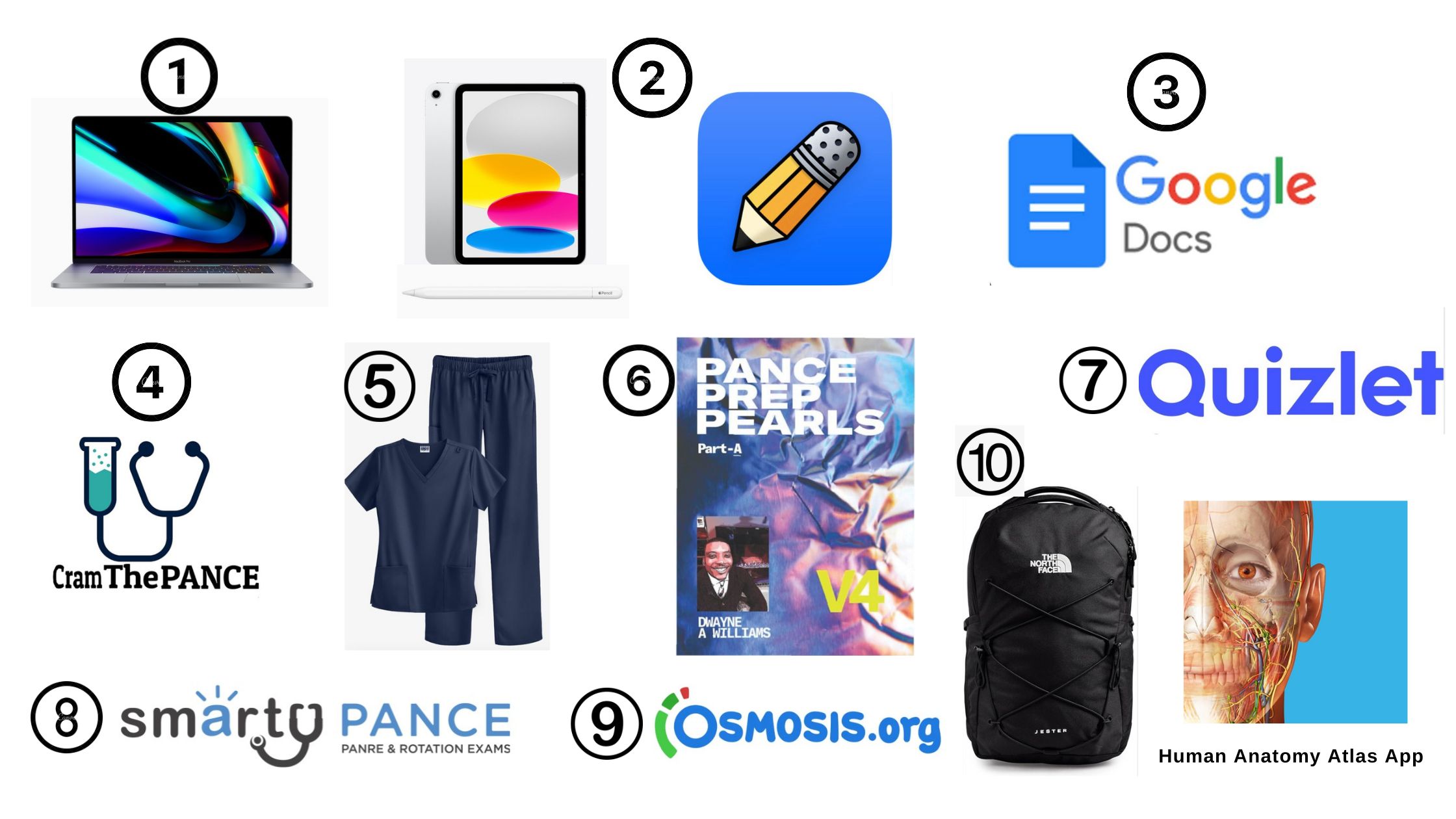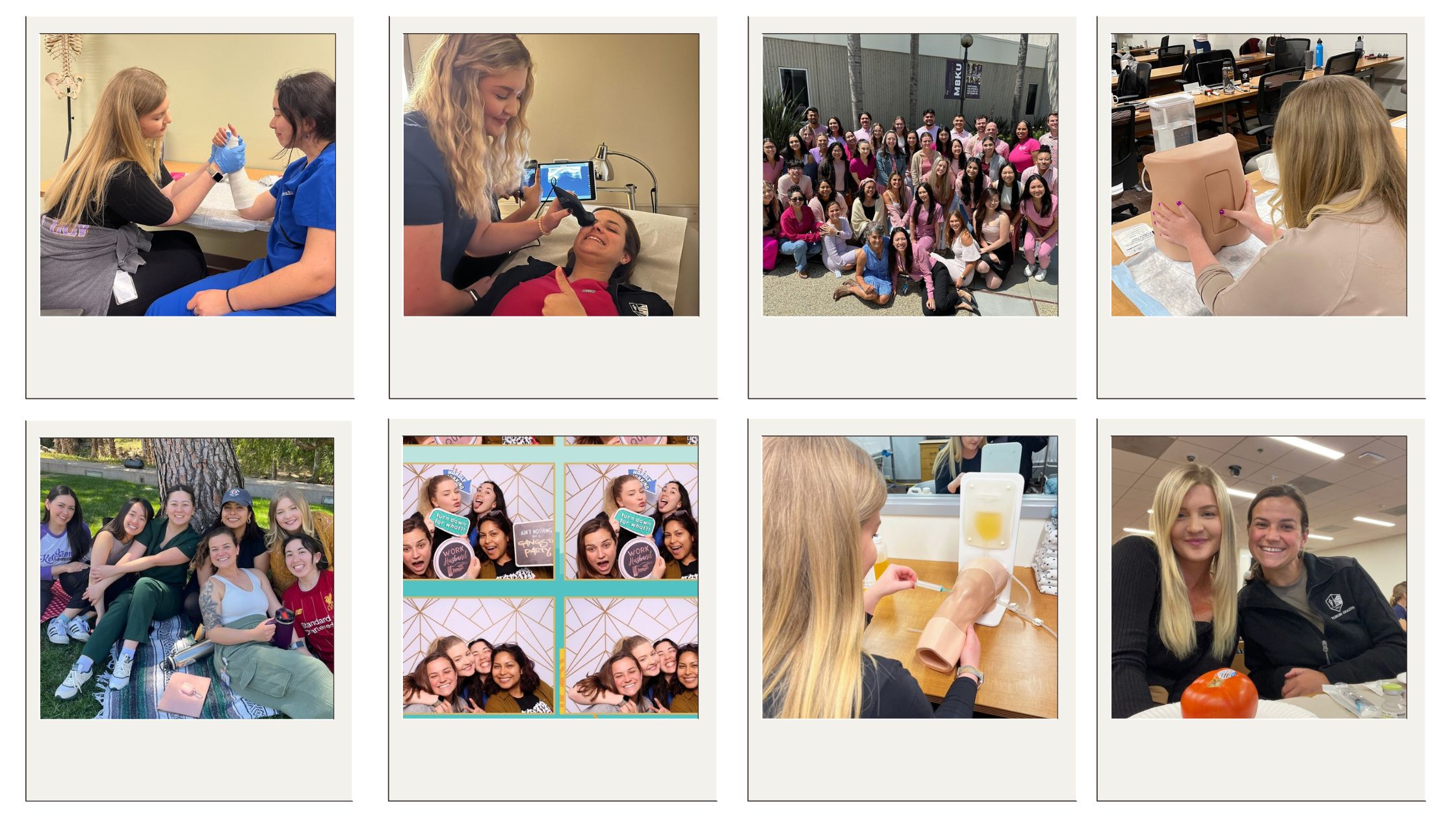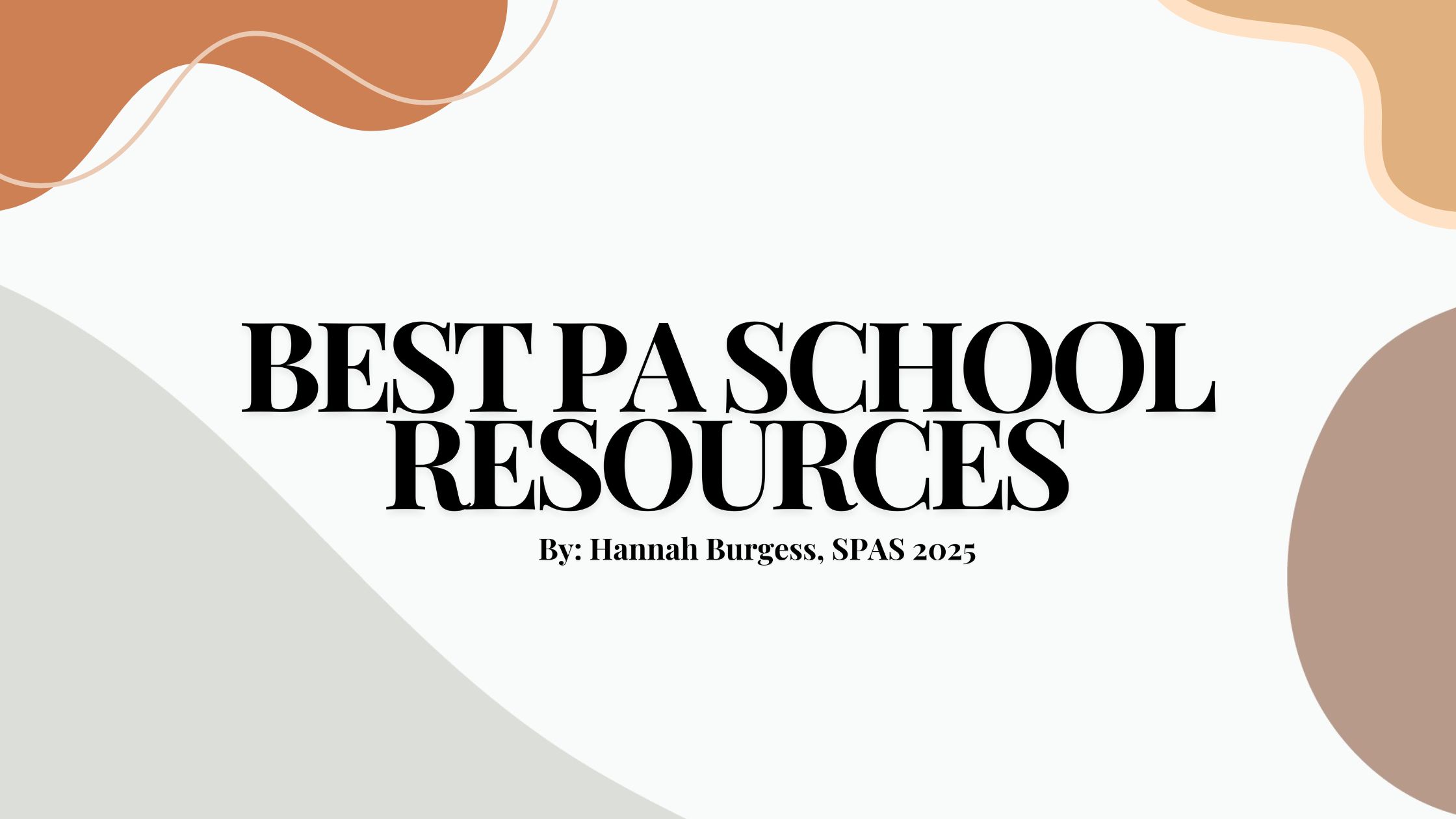Congratulations on getting into PA school!
Starting graduate school is a thrilling, yet overwhelming experience. The anticipation of diving into a new chapter of education can be daunting, especially when faced with an overwhelming array of supplies and resources available. I vividly remember the uncertainty of what to purchase or what resources are best before embarking on this journey. Because of this, I wanted to curate a list of tried-and-true resources that I, and my classmates, use weekly (if not daily) to help us study in PA school. None of the below items are required (except for a laptop), however, these are all things that have helped me be successful in my journey. As you get into the rigorous curriculum of PA school, it is important to know how you learn and study best. You may find that certain techniques work better for you than others, such as taking detailed notes, joining a group study session, listening to podcasts, doing flashcards, etc. My biggest piece of advice is go into this journey with an open mind and be open and flexible to trying out new ways of studying, note taking, etc. as needed.
Here are things that helped me the most during my didactic year:

1. Laptop
I would recommend investing in a good, reliable laptop if you can. I use my MacBook Air every day. We take exams on our laptop so the school does require that you have one. My undergrad laptop was a few years old so I bought a new one prior to starting school to ensure I would not have any issues with the exam software, running out of storage, etc. My classmates have various laptop brands (Dell, HP) so no pressure to get Apple but I would recommend getting a reliable laptop because it will be used daily for writing emails, taking exams, studying, etc.
2. iPad and Notability
The iPad is optional and not required by the school but I cannot recommend an iPad enough! I did not use an iPad for note taking before PA school and so I was worried about how easy it would be to learn but it has been so easy and convenient to use and has been beneficial to my learning. I tried out both Good Notes and Notability and I personally preferred Notability but some classmates do use Good Notes. I download all of the power points for the day onto my Notability app and take handwritten notes/highlight during lecture. Being able to annotate with different colors really helps me stay focused, especially during long lectures days. Also, within Notability app you are able to create organized folders for each class so I find it is easy to back and find notes to reference. Another thing I like about Notability is their “tape” feature that you can tape over a word and click to reveal the text. This is very helpful when studying and quizzing yourself, especially for anatomy.
Speaking of an iPad, a pencil and screen protector are a must-have duo. I tried both the Apple Pencil and an Amazon alternative, I found the Amazon pencil to be the winner in terms of battery life, charging convenience, and cost-effectiveness. While many classmates opt for the Apple Pencil, the choice is yours to make. If you usually like to hand write notes or like the paper/pencil feeling, I would recommend buying the iPad paper screen protector on Amazon. They are inexpensive and make it feel like you are writing on actual paper when taking notes on iPad. I tried it and liked it and I know some of my classmates use it as well.
3. Google Docs
I would highly recommend looking into using Google Docs. I would say that the majority of my class uses Google Docs to create study charts. It can be overwhelming to look back on the slides to study without the amount of information presented. By creating a study chart on Google Docs, the information is presented in an organized and concise way so it is easy to reference and study from. It is basically a large table with a column for signs/symptoms, etiology/pathophysiology/risk factors, diagnostic labs/imaging, and treatment/prevention. I create this chart throughout the week with three other classmates. We all add to it either during lecture or after class. It can be time consuming so I would recommend dividing and conquering with a small group. If you do go this route, another tip is to save a copy of these study charts to your Google Drive so you can have them forever to look back on. Happy to show you can example of a chart, just reach out to me!
4. Cram the PANCE
I would highly, highly recommend Cram the PANCE! This is a podcast that goes over high yield topics/diseases from each module and provides you with mnemonics and tips and tricks for remembering the important details. He also has an episode within most of the body systems where he asks 50 high yield questions and gives the answer. I use this towards the end of the module to test myself and ensure I know the most important points. I wish I started listening to this earlier because it is so helpful. If you like just listening, they offer the podcast on Apple Podcasts or Spotify (BTW: you can get a student discount on Spotify!!). I personally like the visual aspect with listening, so I watch the podcast on YouTube. If you do it this way, he gives you photos of the mnemonics which I like to save and add to our study chart. Other podcasts that my classmates find helpful: Spoonful of Sugar and Physician Assistant Exam Review, also available on Apple Podcasts and Spotify.
5. Scrubs
Scrubs are worn on days that we have skills practice or testing or SIM days. If you don’t already have some, I would recommend investing in a few nice pair of scrubs. I personally love the Cherokee Infinity scrubs, but I know a lot of people in my class love Figs, Beyond Scrubs, Grey’s Anatomy scrubs, Fabletics scrubs, etc. If you do purchase scrubs, I would recommend getting a neutral color (black, navy, etc.) that you can also wear during clinicals. The faculty wears gray scrubs so we are not allowed to wear that color during the didactic year. Also, if you do buy scrubs we were told that some clinical locations do not allow jogger scrub pants. I am not sure how common that is but just a heads up in case you are wanting to purchase scrubs prior to school. Going along with this, I would recommend a good, comfortable pair of shoes. We spend a lot of time during didactic sitting in the classroom but I think a good pairs of shoes is essential, especially once we hit clinicals. I personally rotate between Hoka’s and Dansko Clogs but some of my classmates love On Clouds, Nike, etc.
6. PANCE Prep Pearls Book
This book is amazing. It provides every disease that is on the PANCE Blue Print and provides a brief overview with all of the high yield information that you need to know. I study from the material presented in class but use that to supplement information or help narrow down what is the most important information to know about a certain disease, etc. Some of my classmates prefer using a similar book called PA Passifer. This is another book that can be helpful in identifying the most high yield “must know” points. I don’t use this book every day, but it is nice to reference if you want a condensed version or are wondering what the most important points of a certain disease or condition are.
7. Quizlet or Anki
If you learn best by flashcards, I recommend Quizlet or Anki. I personally have used Quizlet for a couple of topics, such as origins and insertions in anatomy or pharmacology indications, etc. I personally found Anki a bit tricky to get the hang of but a few of my classmates swear by it because of the use of spaced recognition helps achieve long term memory! If you learn best by repetition, this can be a great resource for you.
8. Smarty PANCE
Smarty PANCE is an amazing resource! It is a website that provides practice tests for each body system or module. It does cost around $80 for a one-year subscription, but I split it with 2 other classmates making it around $20 each. I started using this early on in PA school and go through the practice test (usually ~100 questions) the week of the test. This gives me a good idea of important topics, how questions are asked, and tests my knowledge and where I am at knowledge wise leading up to the exam. I know a lot of my classmates use this resource as well and find it very helpful! If you do not want to pay for this, the MBKU Library has a free resource called “PA Exam Prep” that has similar practice type questions. I do find the questions to be more challenging and complicated so it is sometimes not as beneficial but still a good, free resource.
9. Osmosis
Osmosis is another resource that can be helpful. I do not use this resource regularly but it is very helpful if you are visual learner or just need a little more clarification in a certain topic. I mostly use it to supplement my knowledge and information we learn in class. It provides videos on physiological processes and pathophysiology of disease processes. If I am ever confused on a topic or how a disease occurs, I go to Osmosis and it usually is able to clear it up. The videos are usually short, around 10-15 minutes. If you would like to see a sample video before you spend money on a subscription, they do have some videos on YouTube you can check out to see if you find it helpful. They also offer a free, 7-day trial. This is another resource that I split with 2-3 classmates to lower cost.
10. Backpack/Lunch Box
Another investment I made before PA school is a good, solid backpack! I purchased the North Face Jester Backpack. It is a little pricey (around $75) but it has lots of pockets, a padded laptop sleeve, and padding for your back. Any backpack will do but I recommend getting a comfortable one that has a padded sleeve to protect your laptop. I also recommend a lunch box to pack a lunch and snacks for those long lecture days! I just bought one on Amazon.
11. Business Casual Clothes
If you do not already have a selection of business casual clothes, I would recommend getting a few professional pieces. Generally, most of the women in class just wear a pair of nice pants (not jeans) and a blouse and flats. The men usually wear nice pants and a polo or a button up shirt. I wouldn’t go too overboard with buying a new wardrobe, just buying a few solid, professional pieces. Most days we are able to wear casual clothes (no yoga pants, ripped jeans, tank tops, etc.), but we are expected to dress business casual for any guest lecturers. The faculty will discuss the dress code with during the orientation week, just thought it would be helpful to give you a heads up in case you are going to purchase clothes before then.
12. Friendships
The friendships you make in PA school will be an amazing resource. All of my classmates come from various backgrounds and bring unique ideas and perspectives. I have learned so much from my classmates and many will be my friends for life! I would recommend being open to anything and trying to find a group that you study well with early on. Collaboration and camaraderie with your classmates will make all the difference in navigating the challenges (and wins) of PA school. Lean on your classmates, you are all going through the same thing and you will get through it together!

Other honorable mentions from classmates: Keurig/coffee maker, small white board for studying, blue light blocking glasses, planner, headphones, Medcominc (great book if you are a visual learner and like silly pictures to remember stuff) and the Human Anatomy Atlas 2024 app. This app is amazing for studying anatomy. It does cost around $25, but it is pretty similar to the Anatomage table so I found it beneficial to studying anatomy and thought it was worth the money.
As far as things to not purchase, I would recommend not buying a stethoscope, any medical supplies, or any textbooks. Everything you need the school with provide to you. As far as textbooks, the library will give you access to all books needed.
Congratulations again on your acceptance into PA School! This is a huge accomplishment, and you should be incredibly proud of yourself. I understand that it can be a mix of excitement and nerves as you embark on this new journey. Remember to take it day by day, focus on the present moment, and enjoy the process.
It's important to give yourself grace during this time as well. You are stepping into a challenging, yet rewarding, field and it's okay to not have all the answers right away. Celebrate every small win, whether it's understanding a difficult concept, acing a test, or simply feeling more confident in your abilities.
With dedication and passion, I have no doubt that you will excel in PA School. Take a deep breath, believe in yourself, and trust in your abilities. You've got this! Congratulations once again, and best of luck on this incredible journey ahead.

